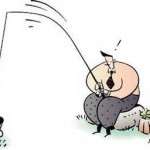The cold-blooded murder of Walter Scott by a South Carolina deputy a few weeks ago highlights numerous issues with a monopolistic, state based approach to “law enforcement.” First and foremost is the all too common hair-trigger response some officers have when interacting with anyone who does not instantly respond to their verbal demands. The expectation seems to be: they say “jump”, you say “how high, sir!” Even the meekest of responses, like “what did I do?” are perceived as a full frontal assault on their “authority” and thus ample justification for unleashing a barrage of “shock and awe” responses. According to Sheriff Ric Bradshaw in Palm Beach (in his attempt to justify a shooting there in 2013 of an unarmed bicyclist) “There’s nothing in the rules of engagement that says we have to put our lives in jeopardy to wait to find out what this is to get killed.” Well, if you don’t want to put your lives in jeopardy might I suggest another line of work? I’m not really sure I wanted to be “protected” by someone who values their own personal safety to the exclusion of all other considerations, up to, and including shooting me dead because I “might” present a risk that they just can’t be bothered to evaluate.
Further problems inherent to the modern police state can be uncovered by evaluating the reason Scott was pulled over and why he (apparently) ran. The stated reason for the stop was a bad taillight. Ok, fine, a taillight being out is a potential safety issue. But the state response to this and similar problems is incongruous with actually ameliorating them and is rather more in alignment with using them as an excuse to impose random, burdensome tolls on unsuspecting motorists (honestly, who among us checks our taillights before we leave the driveway?). For example, in Georgia a bad taillight will garner you a $140 fine. Such fines aren’t fun for anyone but are inherently more burdensome to those in the lower income brackets. These fines hinder the victim’s ability to remedy the situation by taking money out of his or her pocket which could otherwise go toward fixing the actual safety issue. If the state were truly concerned with safety instead of issuing a ticket they would call in a “repair unit” to come to the scene, fix the problem on site and then charge the motorist whatever they would have otherwise been charged at a shop. Now that is customer service! But don’t expect that from the state or its minions. Traffic stops rarely have anything to do with safety and everything to do with revenue collection (speed traps are a well documented phenomena). Once underway they set the stage for a fishing expedition. Which brings us to the third issue.
Once a motorist is pulled over for some matter related to operation of their vehicle, the officer is then free to shift the focus from road safety to any and all matters related to other state laws (typically drug laws). In no other arena of life would people accept that the police can just randomly approach someone and ask for ID and start running background checks (“papers please”), but stick them in a moving vehicle or observe them cross an imaginary line in the dirt (“the border”) and suddenly intrusive questioning is a fait accompli. Such questioning revealed that Scott owed child support. Yes, he should have paid his child support. Yes, he should not have run (I’m reminded of the scene in JurassicPark where the lawyer runs from the T-rex into an outhouse – “Where does he think he’s going?” wryly observes Dr. Alan Grant). But just like in that movie, he ran out of fear without actually thinking it through. But I doubt any of us would have believed that running FROM the police would be perceived as a threat necessitating eight rounds in ones back.
Unfortunately the state-backed child support system sets the stage for violent confrontations. It is the state that threatens violence (to the father or his employer) for non-compliance (employers that refuse to withhold child support payments become liable for those payments). This seems like a massive amount of overkill for what is strictly a private matter. Jail should only be for murderers, rapists, and thieves. They should not become modern day debtor prisons for those unable (or unwilling) to pay child support or other types of garnishment. These issues are private matters and should be left to the parties involved to resolve them. They should not become a matter that the state hijacks. It is due to a breathtaking lack of imagination of those in power that we are left with a system that fails to recognize that people are fairly clever at solving their own problems without resorting to state backed violence.
